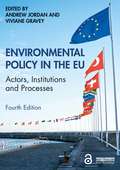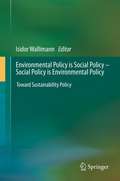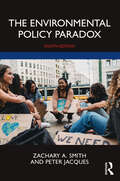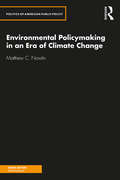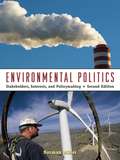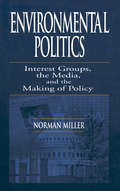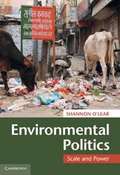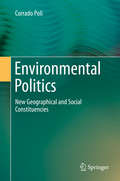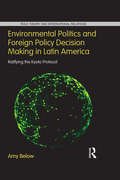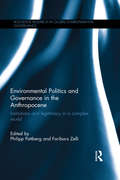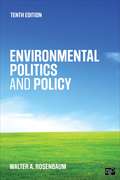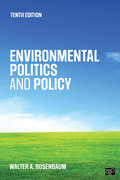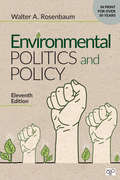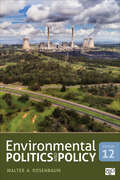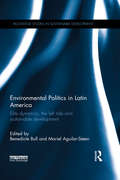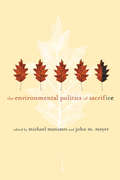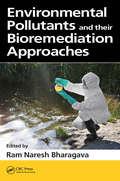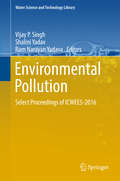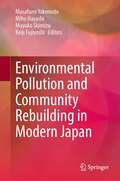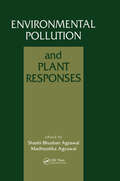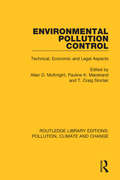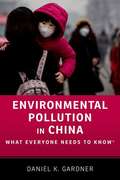- Table View
- List View
Environmental Policy in the EU: Actors, Institutions and Processes
by Andrew Jordan Viviane GraveyThe European Union (EU) has a hugely important effect on the way in which environmental policies are framed, designed and implemented in many parts of the world, but especially Europe. The new edition of this leading textbook provides a state-of-the-art analysis of the EU’s environmental policies. Comprising five parts, Environmental Policy in the EU covers the rapidly changing context in which EU environmental policies are made, the key actors who interact to co-produce them and the most salient dynamics of policy making, ranging from agenda setting and decision making, through to implementation and evaluation. Written by leading international experts, individual chapters examine how the EU is responding to a multitude of different challenges, including biodiversity loss, climate change, energy insecurity, and water and air pollution. They tease out the different ways in which the EU’s policies on these topics co-evolve with national and international environmental policies. In this systematically updated fourth edition, a wider array of learning features are employed to ensure that readers fully understand how EU environmental policies have developed over the last 50 years and how they are currently adapting to the rapidly evolving challenges of the twenty-first century, including the COVID-19 pandemic. It is an essential resource for undergraduate and postgraduate students studying environmental policy and politics, climate change, environmental law and EU politics more broadly.
Environmental Policy is Social Policy – Social Policy is Environmental Policy
by Isidor WallimannThis book argues that social and environmental policy should be synthetically treated as one and the same field, that both are but two aspects of the same coin - if sustainability is the goal. Such a paradigm shift is indicated, important, and timely to effectively move towards sustainability. This book is the first to take this approach and to give examples for it. Not to synthetically merge the two fields has been and will continue to be highly insufficient, inefficient and contradictory for policy and public administration aiming for a transformation towards a sustainable world. In general, social problems are dealt with in one "policy corner" and environmental problems in another. Rarely is social policy (at large) concerned with its impact on the environment or its connection with and relevance to environmental policy. Equally, environmental problems are generally not seen in conjunction with social policy, even though much environmental policy directly relates to health, nutrition, migration and other issues addressed by social policy. This book intends to correct the pattern to separate these very significant and large policy fields. Using examples from diverse academic and applied fields, it is shown how environmental policy can (and should) be thought of as social policy - and how social policy can (and should) simultaneously be seen as environmental policy. Tremendous benefits are to be expected.
The Environmental Policy Paradox
by Zachary A. Smith Peter JacquesNow in its eighth edition, The Environmental Policy Paradox continues the book's tradition of offering an accessible introduction to the social, economic, legal, and political matters pertaining to environmental policy while also developing the student’s own unique views. The text explains why some environmental ideas shape policy while others do not and illustrates that even when the best short- and long-term solutions to environmental problems are identified, the task of implementing these solutions is often left undone or is completed too late. New to the eighth edition: New topics including environmental social movements and the anti-environmental countermovements, environmental justice, corporate influence in regulatory affairs. Analyzes the growing policy divide between the two parties, and the efforts of both Republicans and Democratic presidents to undo the policies of their predecessor. Updated discussions of environmental justice issues. Includes a range of visual aids in figures and tables to demonstrate trends in the topics covered. A new co-author, Peter Jacques, recognized for his teaching and scholarship in global environmental politics and sustainability. A must-buy for courses in Environmental Policy, Environmental Studies, and Public Policy; and as a supplement for courses in American Government and Public Administration.
Environmental Policymaking in an Era of Climate Change
by Matthew C. NowlinAs the world considers how to deal with the impacts of a changing climate, it’s vital that we understand the ways in which the United States’ policymaking process addresses environmental issues. A mix of existing theory and original analysis, Environmental Policymaking in an Era of Climate Change applies recent policy scholarship to questions of environmental governance, with a particular focus on climate change. The book examines how competing political actors influence policies within and across institutions, focusing on both a macro-level, where formal bodies set the agenda, and a meso-level, where issues are contained within policy subsystems. Divided into two sections, the book incorporates insights from political science and public policy to provide the reader with a better understanding of how environmental policy decisions are made. Part I offers a framework for understanding environmental policymaking, exploring the history of environmental policy, and discussing the importance of values in environmental policy. Part II applies the framework to the issue of climate change, focusing on agenda-setting and the role of formal institutions in the policymaking process, covering topics that include Congress, the Executive and Judicial branches, and how climate change cuts across policy subsystem boundaries. By placing specific climate change case studies in a broader context, Environmental Policymaking in an Era of Climate Change will help students enrolled in political science, public administration, public policy, and environmental studies courses – as well as all those interested in the impacts of policy on climate change – to understand what is, and will likely continue to be, one of the most pressing policy issues of our time.
Environmental Politics: Stakeholders, Interests, and Policymaking
by Norman MillerThe second edition of Environmental Politics: Stakeholders, Interests, and Policymaking shows students that environmental politics is fundamentally a clash of competing stakeholders’ interests, and environmental policy the result of their reconciliation. But developments in environmental policymaking over the past several years have been little short of earthshaking. The text not only marks changes in the formal lawmaking process itself, but covers recent elements reshaping environmental politics, such as: the new environmentally activist posture of business the dramatic shift of policymaking influence from the federal to state and local levels the participation of new actors on the environmental policy stage, most notably the faith community the U-turn of organized labor, from opponent of environmentalists to their collaborator the consolidation of the varying missions of environmental advocacy groups to fight global warming the emergence of science from its historic political neutrality to open advocacy the increasing role of both the media and the judiciary Written by an expert with more than 25 years of "smoke-filled room" experience in environmental policymaking, Environmental Politics: Stakeholders, Interests, and Policymaking gives students an insider's view of how policies are forged. By examining current environmental issues through a stakeholder lens, this book not only provides a unique perspective into how policies are adopted, but also illuminates the transformative power of global warming as a political force.
Environmental Politics: Interest Groups, the Media, and the Making of Policy
by Norman MillerAt every stage, environmental policy is the result of the combat of stakeholders interested in, and affected by, the problem being addressed and the range of possible solutions. The combatants include any or all of the following: the federal government, environmental advocacy groups, and business, the media, the scientific community, think tanks, NGOs of every stripe, trade associations and professional organizations, and even state and local governments, each of whom have their own interests in the resulting policy. Environmental Politics: Interest Groups, the Media, and the Making of Policy discusses political battles over the environment from ground level - as they are fought in legislative chambers, the daily newspaper, on television, and, increasingly, on the Internet. The text explores environmental politics as a clash of interests, not ideologies, and environmental policy as a result of the reconciliation of those interests.
Environmental Politics: Scale and Power
by Shannon O'LearShannon O'Lear brings a geographer's perspective to environmental politics. The book considers issues of climate change, energy, food security, toxins, waste, and resource conflict to explore how political, economic, ideological and military power have contributed to the generation of environmental issues and the formation of dominant narratives about them. The book encourages the reader to think critically about the power dynamics that shape (and limit) how we think about environmental issues and to expand the reader's understanding of why it matters that these issues are discussed at particular spatial scales. Applying a geographer's sense of scale and power leads to a better understanding of the complexity of environmental issues and will help formulate mitigation and adaptation strategies. The book will appeal mainly to advanced students and researchers from a geography background, but also to social and political scientists who wish to look at the topic from this different perspective.
Environmental Politics
by Corrado PoliA change in the way humans relate to nature could be the starting point for a new politics, which will also affect relations among humans. A new approach would help to radically transform the production system, not because it is unjust in the usually considered social terms, but because it endangers nature and humanity. So far, the citizens' grassroots organizations have failed to win broad consensus and political power in the representative institutions. When the time comes to transform the single environmental issue into an electoral platform, environmentalists lose unity and effectiveness since they lack a common political vision and an ensuing strategy. On the other hand European politics is rapidly transforming because the challenge brought by so-called populist movements. We need to transform activists' shared emotions and attitudes into political ideologies and platforms. Moreover, a new educational process and a new science politics are necessary to reform environmental policy.
Environmental Politics and Foreign Policy Decision Making in Latin America: Ratifying the Kyoto Protocol (Role Theory and International Relations)
by Amy BelowAlthough the Kyoto Protocol, an international agreement to address global climate change, has been regarded by many as an unsuccessful treaty both politically and environmentally, it stands as one of the world’s few truly global agreements. Why did such a diverse group of countries decide to sign and/or ratify the treaty? Why did they choose to do so at different times and in different ways? What explains their foreign policy behavior? Amy Below’s book builds off the increasing significance of climate change and uses the Kyoto Protocol as a case study to analyze foreign policy decision making in Latin America. Below’s study takes a regional perspective in order to examine why countries in Latin America made disparate foreign policy choices when they were faced with the same decision. The book looks at the decisions in Argentina, Mexico, and Venezuela via a process-tracing method. Below uses information obtained from primary and secondary documents and elite interviews to help reconstruct the processes, and augments her reconstruction with a content analysis of Conference of the Parties speeches by presidents and country delegates. The book complies with convention in the field by arguing that systemic, national and individual-level factors simultaneously impact foreign policy decisions, but makes the additional claim that role theory most accurately accounts for relationships between variables. Environmental Politics and Foreign Policy Decision Making in Latin America considers a variety of factors on individual, national, and international levels of analysis, and show that the foreign policy decisions are best viewed through the prism of role theory. The book also draws conclusions about the value of role theory in general and about environmental foreign policy decisions in developing countries, which will be of value to both policy-makers and academics.
Environmental Politics and Governance in the Anthropocene: Institutions and legitimacy in a complex world (Routledge Research in Global Environmental Governance)
by Fariborz Zelli Philipp PattbergThe term Anthropocene denotes a new geological epoch characterized by the unprecedented impact of human activities on the Earth’s ecosystems. While the natural sciences have advanced their understanding of the drivers and processes of global change considerably over the last two decades, the social sciences lag behind in addressing the fundamental challenge of governance and politics in the Anthropocene. This book attempts to close this crucial research gap, in particular with regards to the following three overarching research themes: (i) the meaning, sense-making and contestations emerging around the concept of the Anthropocene related to the social sciences; (ii) the role and relevance of institutions, both formal and informal as well as international and transnational, for governing in the Anthropocene; and (iii) the role and relevance of accountability and other democratic principles for governing in the Anthropocene. Drawing together a range of key thinkers in the field, this volume provides one of the first authoritative assessments of global environmental politics and governance in the Anthropocene, reflecting on how the planetary scale crisis changes the ways in which humans respond to the challenge. This volume will be of great interest to students and scholars of global environmental politics and governance, and sustainable development.
Environmental Politics and Policy
by Walter A. RosenbaumThis book covers the context of the environmental policy process, as well as exploring specific environmental issues. It examines topics such as toxic and hazardous substances; energy - both fossil fuel and nuclear' public lands; and global policy-making ocusing on climate change and transboundary politics.
Environmental Politics and Policy
by Walter A. RosenbaumWalter A. Rosenbaum’s classic Environmental Politics and Policy, Tenth Edition once again provides definitive coverage of environmental politics and policy, lively case material, and a balanced assessment of current environmental issues. The first half of the book sets needed context and describes the policy process while the second half covers specific environmental issues such as air and water; toxic and hazardous substances; energy; and a global policymaking chapter focused on climate change and transboundary politics. Covering major environmental policy initiatives and controversies during President Obama's two terms and capturing the sudden and radical changes occurring in the American energy economy, this Tenth Edition offers the needed currency and relevancy for any environmental politics course.
Environmental Politics and Policy
by Walter A. RosenbaumWalter A. Rosenbaum’s classic Environmental Politics and Policy, Tenth Edition once again provides definitive coverage of environmental politics and policy, lively case material, and a balanced assessment of current environmental issues. The first half of the book sets needed context and describes the policy process while the second half covers specific environmental issues such as air and water; toxic and hazardous substances; energy; and a global policymaking chapter focused on climate change and transboundary politics. Covering major environmental policy initiatives and controversies during President Obama's two terms and capturing the sudden and radical changes occurring in the American energy economy, this Tenth Edition offers the needed currency and relevancy for any environmental politics course.
Environmental Politics and Policy
by Walter A. RosenbaumWalter A. Rosenbaum’s classic Environmental Politics and Policy provides definitive coverage of environmental politics and policy, lively case material, and a balanced assessment of current environmental issues. The first half of the book sets needed context and describes the policy process while the second half covers specific environmental issues such as air and water; toxic and hazardous substances; energy; and a global policymaking chapter focused on climate change and trans-boundary politics. The eleventh edition includes updates on the Trump administration's initiatives and controversies with regard to environmental policy, offering the currency and relevancy needed for any environmental politics course.
Environmental Politics and Policy
by Walter A. RosenbaumWalter A. Rosenbaum’s classic Environmental Politics and Policy provides definitive coverage of environmental politics and policy, lively case material, and a balanced assessment of current environmental issues. The first half of the book sets needed context and describes the policy process while the second half covers specific environmental issues such as air and water; toxic and hazardous substances; energy; and a global policymaking chapter focused on climate change and trans-boundary politics. The eleventh edition includes updates on the Trump administration's initiatives and controversies with regard to environmental policy, offering the currency and relevancy needed for any environmental politics course.
Environmental Politics and Policy
by Walter A. RosenbaumWalter A. Rosenbaum′s classic Environmental Politics and Policy, Twelfth Edition, provides definitive coverage of environmental politics and policy, lively case material, and a balanced assessment of current environmental issues. The newly streamlined first half of the book sets needed context and describes the policy process, while the second half covers specific environmental issues such as air and water, toxic and hazardous substances, energy, and global policymaking on issues like climate change and trans-boundary politics. The Twelfth Edition includes updated case studies and a look at the transition in environmental policies between the Trump and Biden administrations, offering students a current and relevant look at the continuing challenge of reconciling sound science with practical politics.
Environmental Politics and Policy
by Walter A. RosenbaumWalter A. Rosenbaum′s classic Environmental Politics and Policy, Twelfth Edition, provides definitive coverage of environmental politics and policy, lively case material, and a balanced assessment of current environmental issues. The newly streamlined first half of the book sets needed context and describes the policy process, while the second half covers specific environmental issues such as air and water, toxic and hazardous substances, energy, and global policymaking on issues like climate change and trans-boundary politics. The Twelfth Edition includes updated case studies and a look at the transition in environmental policies between the Trump and Biden administrations, offering students a current and relevant look at the continuing challenge of reconciling sound science with practical politics.
Environmental Politics in Latin America: Elite dynamics, the left tide and sustainable development (Routledge Studies in Sustainable Development)
by Benedicte Bull Mariel Cristina Aguilar-StoenSince colonial times the position of the social, political and economic elites in Latin America has been intimately connected to their control over natural resources. Consequently, struggles to protect the environment from over-exploitation and contamination have been related to marginalized groups’ struggles against local, national and transnational elites. The recent rise of progressive, left-leaning governments – often supported by groups struggling for environmental justice – has challenged the established elites and raised expectations about new regimes for natural resource management. Based on case-studies in eight Latin American countries (Argentina, Brazil, Chile, Ecuador, Colombia, Bolivia, El Salvador and Guatemala), this book investigates the extent to which there have been elite shifts, how new governments have related to old elites, and how that has impacted on environmental governance and the management of natural resources. It examines the rise of new cadres of technocrats and the old economic and political elites’ struggle to remain influential. The book also discusses the challenges faced in trying to overcome structural inequalities to ensure a more sustainable and equitable governance of natural resources. This timely book will be of great interest to researchers and masters students in development studies, environmental management and governance, geography, political science and Latin American area studies.
The Environmental Politics of Sacrifice (The\mit Press Ser.)
by Edited by Michael Maniates John M. MeyerAn argument that the idea of sacrifice, with all its political baggage, opens new paths to environmental sustainability.The idea of sacrifice is the unspoken issue of environmental politics. Politicians, the media, and many environmentalists assume that well-off populations won't make sacrifices now for future environmental benefits and won't change their patterns and perceptions of consumption to make ecological room for the world's three billion or so poor eager to improve their standard of living. The Environmental Politics of Sacrifice challenges these assumptions, arguing that they limit our policy options, weaken our ability to imagine bold action for change, and blind us to the ways sacrifice already figures in everyday life. The concept of sacrifice has been curiously unexamined in both activist and academic conversations about environmental politics, and this book is the first to confront it directly. The chapters bring a variety of disciplinary perspectives to the topic. Contributors offer alternatives to the conventional wisdom on sacrifice; identify connections between sacrifice and human fulfillment in everyday life, finding such concrete examples as parents' sacrifices in raising children, religious practice, artists' pursuit of their art, and soldiers and policemen who risk their lives to do their jobs; and examine particular policies and practices that shape our understanding of environmental problems, including the carbon tax, incentives for cyclists, and the perils of green consumption. The Environmental Politics of Sacrifice puts “sacrifice” firmly into the conversation about effective environmental politics and policies, insisting that activists and scholars do more than change the subject when the idea is introduced.ContributorsPeter Cannavò, Shane Gunster, Cheryl Hall, Karen Litfin, Michael Maniates, John M. Meyer, Simon Nicholson, Anna Peterson, Thomas Princen, Sudhir Chella Rajan, Paul Wapner, Justin Williams
Environmental Pollutants and their Bioremediation Approaches
by Ram Naresh BharagavaThis book is a compilation of detailed and latest knowledge on the various types of environmental pollutants released from various natural as well as anthropogenic sources, their toxicological effects in environments, humans, animals and plants as well as various bioremediation approaches for their safe disposal into the environments. In this book, an extensive focus has been made on the various types of environmental pollutants discharged from various sources, their toxicological effects in environments, humans, animals and plants as well as their biodegradation and bioremediation approaches for environmental cleanup.
Environmental Pollution
by Vijay P Singh Shalini Yadav Ram Narayan YadavaThis book comprises select proceedings of the International Conference on Water, Environment, Energy and Society. The book is divided into five parts. The first part deals with some aspects of environmental pollution such as socio-economic environment assessment for sustainable development, environmental issues due to fire in coal Mines and its impact and suggestions for implementing precautionary and control measures, redevelopment of urban slum dwellings: issues & challenges, air and noise pollution in mega cities, importance of indoor environmental quality in green buildings. Part II discusses pollution indicators such as assessment and prediction of environmental noise, fuzzy logic based performance evaluation, fish biodiversity and its periodic reduction, effects of anthropogenic activities on fresh water ecosystems, and monitoring of air pollution. Part III focuses on generation of pollution namely biomedical waste generation and management, heavy metal leaching, etc. Water quality assessment is described in Part IV. The Part V presents water quality modeling. The book will be of interest to researchers and practitioners in the field of water resources, hydrology, environmental resources, agricultural engineering, watershed management, earth sciences, as well as those engaged in natural resources planning and management. Graduate students and those wishing to conduct further research in water and environment and their development and management will also find the book to be of value.
Environmental Pollution and Community Rebuilding in Modern Japan
by Masafumi Yokemoto Miho Hayashi Mayuko Shimizu Keiji FujiyoshiThis book describes how modern industry affected people in Japan and their communities by polluting their living environment with toxic emissions. It also shows how the populace endeavored not only to restore their once-clean environment but also to rebuild communities that had been damaged by pollution and its accompanying effects. Environmental pollution is usually referred to in Japan as kogai, public damage, meaning that such pollution not only harms the physical environment—air, water, soil, and the human body—but also destroys the social and personal relationships in the polluted area. Those people who took action recognized that industrial and economic development had been given the highest national priority even at the cost of their health and welfare. In this sense, anti-kogai movements led them to alternative community development and to rethinking what kind of environment and community they wanted. This book also explores the efforts driven by residents in several parts of Japan after the middle of the twentieth century and the endeavors of museums and archives as a memorial to those who suffered from the pollution and for the prospect of a better society with a good environment.
Environmental Pollution and Plant Responses
by Shashi Bhushan Agrawal Madhoolika AgrawalComprehensive and global in scope, Environmental Pollution and Plant Responses provides an analysis of the research on the factors contributing to the deteriorating environmental quality and its effect on plant performance. The issues include: environmental pollution and global climate change, response patterns of plants at different levels, mechanisms of interaction, tolerance strategies and future research prospects. The author evaluates trends and gives management strategies for abating the problem. This volume highlights the complexities of environmental problems and the affect of pollution on every level of the ecosystem.
Environmental Pollution Control: Technical, Economic and Legal Aspects
by Allan D. McKnight Pauline K. Marstrand T. Craig SinclairOriginally published in 1974 this volume brings together contributions from lawyers, a nuclear physicist, a landscape architect, biologist, engineers and a former Inspector of the International Atomic Energy Agency. It covers technical and legal information on air, water, sea, land and noise pollution and provides a comprehensive guide, summary and introduction to the journal literature in separate but relevant disciplines. All of the contributors have specialised in studies in pollution control and contributed to the debate on use and management of the environment.
Environmental Pollution in China: What Everyone Needs to Know (What Everyone Needs To Know)
by Daniel K. GardnerChina suffers from a range of environmental pollution problems: air, water, soil, electronic waste, noise, and light. But air, water, and soil pollution and the scourge of electronic waste have been the most environmentally costly and have had the most dramatic effects on public health. In Environmental Pollution in China: What Everyone Needs to Know, Daniel K. Gardner examines the range of factors -- economic, social, political, and historical -- contributing to the degradation of China's environment. He also covers the public response to the widespread pollution; the measures the government is taking to clean up the environment; and the country's efforts to lessen its dependence on fossil fuels and develop clean sources of energy. Concise, accessible, and authoritative, this book serves as an ideal primer on one of the world's most challenging environmental crises.
